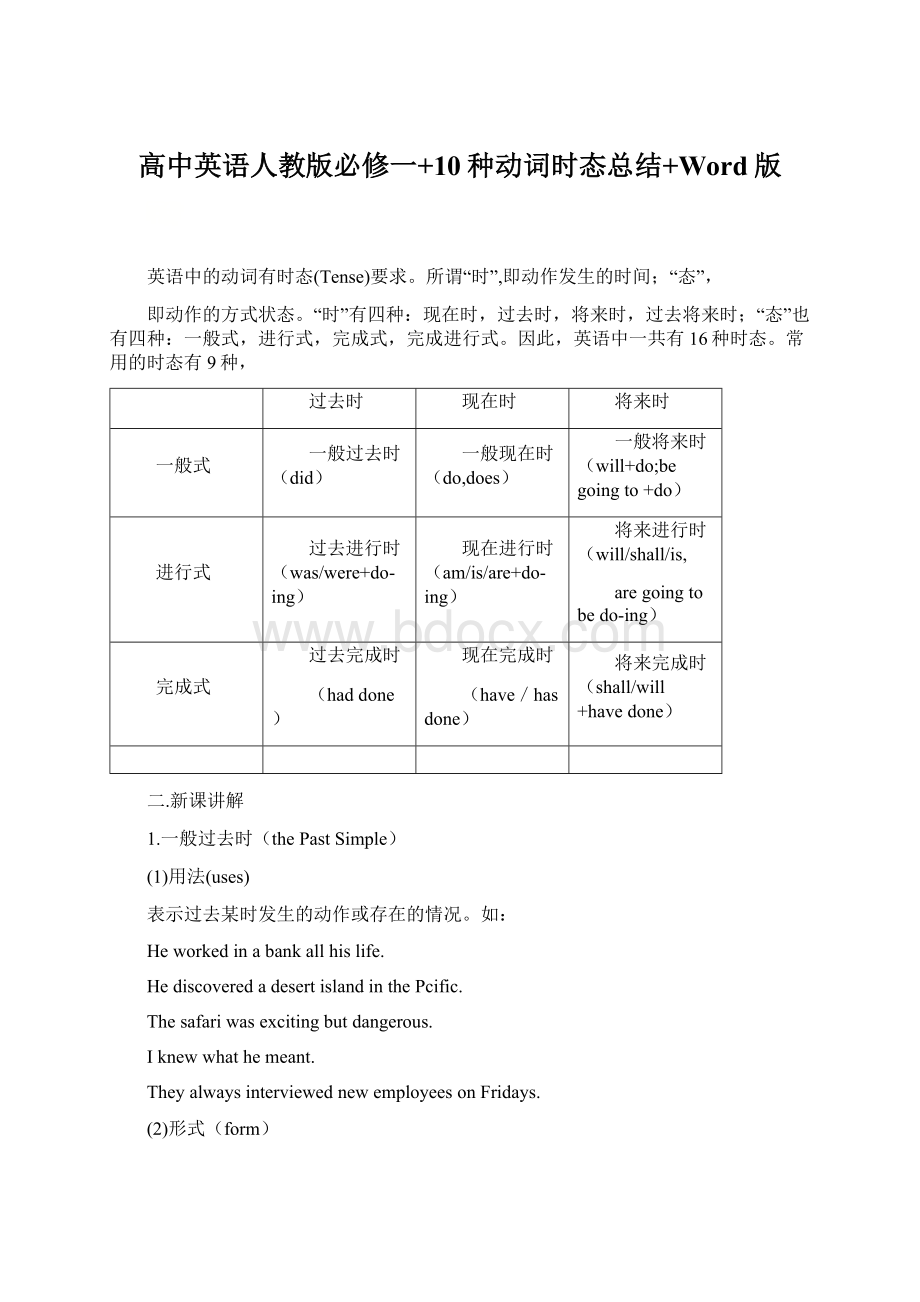高中英语人教版必修一+10种动词时态总结+Word版.docx
《高中英语人教版必修一+10种动词时态总结+Word版.docx》由会员分享,可在线阅读,更多相关《高中英语人教版必修一+10种动词时态总结+Word版.docx(14页珍藏版)》请在冰豆网上搜索。

高中英语人教版必修一+10种动词时态总结+Word版
英语中的动词有时态(Tense)要求。
所谓“时”,即动作发生的时间;“态”,
即动作的方式状态。
“时”有四种:
现在时,过去时,将来时,过去将来时;“态”也有四种:
一般式,进行式,完成式,完成进行式。
因此,英语中一共有16种时态。
常用的时态有9种,
过去时
现在时
将来时
一般式
一般过去时(did)
一般现在时(do,does)
一般将来时(will+do;begoingto+do)
进行式
过去进行时(was/were+do-ing)
现在进行时(am/is/are+do-ing)
将来进行时(will/shall/is,
aregoingtobedo-ing)
完成式
过去完成时
(haddone)
现在完成时
(have/hasdone)
将来完成时(shall/will+havedone)
二.新课讲解
1.一般过去时(thePastSimple)
(1)用法(uses)
表示过去某时发生的动作或存在的情况。
如:
Heworkedinabankallhislife.
HediscoveredadesertislandinthePcific.
Thesafariwasexcitingbutdangerous.
Iknewwhathemeant.
TheyalwaysinterviewednewemployeesonFridays.
(2)形式(form)
即动词的过去式,分两种情况,一种是在动词结尾加ed或ied,这种动词称为规则动词,另一种不能加,形式多样,称为不规则动词。
规则动词:
a.一般情况下,动词词尾加-ed,如:
work-workedplay-playedwant-wantedact-acted
b.以不发音的-e结尾动词,动词词尾加-d,如:
live-livedmove-moveddecide-decideddecline-declined
hope-hopedjudge-judgedraise-raisedwipe-wiped
c.以辅音字母+y结尾的动词,把-y变为-i再加-ed,如:
study-studiedtry-triedcopy-copiedjustify-justified
cry-criedcarry-carriedembody-embodiedempty-emptied
d.以一个辅音字母结尾的重读闭音节动词,双写词尾辅音字母,再加-ed,如:
stop-stoppedbeg-beggeddrag-draggeddrop-dropped
plan-planneddrip-dripped
不规则动词的过去式变化规律性不强,须多加记忆。
go-wentmake-madeget-gotbuy-bought
come-camefly-flew
(3)一般过去时的时间状语PastSimpleandTimeAdverbials
下列时间状语常和一般过去时连用:
yesterday,lastmonth,lastMonday,twodaysago,threeyearsago等等。
即在句子中出现这样的词语时,要注意句子的谓语动词用一般过去时。
Ifinallypassedthedrivingtestlastweek.
(4)一般过去时的疑问式和否定式:
一般过去时的疑问句和否定句用did和didn’t+动词原形。
如:
Didyouseethematchlastnight?
Wedidn’tseethebeginningofthemoviebecausewewerelate.
2.一般现在时(PresentSimple)
(1)用法uses
a.表示反复发生的动作,日常活动,习惯等。
如:
Ialwaystakesugarincoffee.
Idon’tsmoke.
Marywearsaponytail.
b.表示一般的真理或永久性的状态。
如:
Waterfreezesat32Fahrenheit.
Wehaveaverygoodrelationshipwithourparents.
Heresembleshisfather.
c.表示将来的官方事件或不变的时间表。
如:
TheChineseSpringFestivalfallsonaFridaynextyear.
Thelastfilmshowbeginsat9p.m.
2.形式(Form)
a.陈述句中,除第三人称单数外,谓语动词都用原形。
如:
IliveinNanyang.
TheyusuallywatchTVprogrammesonSaturdayevening.
b.陈述句中,主语为第三人称单数(thirdpersonsingular),谓语动词的结尾要加-s或-es(以y结尾的y变i加-es)。
什么是第三人称单数?
要满足两个条件,第一是第三人称,如she,he,they,it,John,myfather等等;第二是单数,即表示一个人或物,比如he,she,it,John,myfather等等,而they他们,是复数,多个人,不是单数。
如:
Shehurriestoworkeverymorning.
Heputsonspecialequipmentwhenhedives.
c.在疑问句,否定句或简略答语中,用do或does。
如:
Doesyourmothertravelalot?
Yes,shedoes./No,shedoesn’t.
Wedon’tlikeextremesports.
Marydoesn’tunderstandwhyriskisexciting.
d.一般现在时的时间状语(PresentSimpleandtimeadverbials)
句子中如果有以下词语(时间状语),谓语动词常要用一般现在时。
always,usually,regularly,everymorning/day/night/week/year,often,
sometimes,occasionally,fromtimetotime,twiceaweek,rarely,seldom,
onceamonth,hardlyever,never.等等
IknowthatIdoputpeopledownoccasionally.
Heregularlyswimsandplaystennis.
Somepeoplenevergoonadventureholidays.
Fromtimetotime,Idreamaboutbecomingamillionaire.
3.一般将来时(theFutureIndefinite)
(1)用法uses
a.依据观点或信念揣测未来。
如:
Shewillmakeagoodlawyer.
YouwillmakegreatprogressinEnglishstudyifyoufollowmyadviceandtakepersistentefforts.
IthinkChinawillbecomearichcountryoneday.
Whodoyouthinkwillwinthematch.
b.表示说话时瞬间做出的决定,可能是提议或意图。
如:
Allright,Iwillhelpyouwiththehousework.
IthinkIwon’tgotothepartyafterall.
IthinkIwillgoforawalk.Ihaveaslightheadache.
c.表示意愿、承诺和提议。
如:
Iwillalwaysbeyourfriend.
Shewillbringbackyourbicycletomorrow.
d.表示请求、邀请。
如:
Willyoucomewithme?
Willyouwaitforme?
WillyoucometomypartyonSundayevening?
e.依据现在看到的迹象对未来事件做出推断。
如:
Lookattheclouds;it’sgoingtorain.
Heisgoingtowinthematch.
f.表示要做某事的主观意图。
如:
Iamgoingtochangemylifestylecompletely.
Iamgoingtostudymedicine/law/finearts.
Myparentsaregoingtomovetothecountryside.
(2)形式(Form)
will+动词原形(a,b,c,d);
begoingto+动词原形(e,f).
beto+动词原形。
如:
TheyaretobemarriedinJune.
ThePrimeMinisteristovisitChinanextmonth.
ThebridgeistobeopentotrafficonOct.1.
4.过去进行时(PastContinuous)
(1)用法(uses)
a.过去一段时间内的持续动作。
如:
IwasplanningtogoonatriptoGreece.
Therobberswerewaitingatthebusstop.
Hewasreadingfrommorningtillnightyesterday.
b.描述故事发生的背景或状态。
如:
Hewassleepingunderatreewhenthestormbegan.
Weweretalkingquietlyatthebarwhenafightbrokeout.
过去进行时和一般过去时用于同一个句子时,过去进行时描述故事发生的背景,过去时说明该事件。
如:
Intheend,Iwasstandingthereinastateofshockwhenapolicemanaskedmeformynameandaddress.
HewashavinglunchwhentheearthquakewasreportedonTV.
(2)形式(Form)
was/were+动词-ing.如:
Hewasworkinginthegardenalthoughitwasraininghard.
Thetrapezeartistwaspreparingheract.
Wasthetrapezeartistpreparingheract?
Thetrapezeartistwasn’tpreparingheract.
5.现在进行时(PresentContinuous)
(1)用法uses
a.表示说话时正在进行的动作。
如:
Excuseme,youaresittinginmyseat.
Myagentiswaitingforme,Ihavetogo.
WearestudyingEnglishnow.
b.表示一定时间段内经常进行的动作(暂时的日常活动或习惯)。
如:
WeareeatingalotofseafoodhereinSpain.
Wearestrugglingwithbackwardnessandpoverty.
c.已经确定或安排好的将来活动。
如:
WeareflyingtoParistomorrowmorning.
IamleavingforatrekinNepalnextweek.
Iamwritingtohertonight.
Willyoupostthisletterformeifyouarepassingapostbox?
(2).形式form
am,is,are+动词-ing.
Iamstayingataluxurioushotelbythesea.
Grandpaisforgettingthingsnowadays.
AretheyplanningtospendtheirholidaysinCorsica?
(3).现在进行时的时间状语(PresentContinuousandtimeadverbials)
常见的有:
just,now,atthemoment,atpresent.这些时间状语可放在be和v-ing之间,可以放在句尾,也可以放在句首。
Iamjustdrivingtowork.
Wearehavingameetingatthemoment/now/atpresent.
Atpresent,manyscientistsarelookingforintelligentformsoflifeoutside
theEarth.
(4)动词-ing的拼写规则
a.一般情况下直接加ing,如:
think---thinkingsleep---sleepingspeak---speaking
b.动词词尾是辅音字母加不发音的字母e结尾的,去掉字母e,再加ing
wake---wakingmake---makingcome---coming
take---takingleave---leavinghave---having
c.以重读闭音节结尾,呈现“辅,元,辅”结构的动词,先双写末尾的辅音字母,再加ing。
begin,cut,get,hit,run,set,sit,spit,stop,swim,beg,drop,fit,nod,dig,forget,regret,rid,put,travel等。
d.以y结尾的动词,直接加ing
carry——carryingenjoy——enjoyingstudy--studying
e.以ie结尾的动词,把ie改为y,再加ing
die---dyinglie---lying
6.将来进行时(FutureContinuous)
will/begoingto+be+动词-ing.
Thistimetomorrow,wewillbecrossingtheAtlantic.
We’dbettermovethediningtableintothekitchen.Wewillbeeatingthereduringthewinter.
7.过去完成时(thePastPerfect)
过去完成时表示过去某一时间或动作以前已经发生或完成了的动作.
它表示动作发生的时间是“过去的过去”.
Hiseyesshonebrightlywhenhefinallyreceivedthemagazinehehadlongexpected.当她终于收到她盼望已久的杂志时,她兴奋得两眼闪光.
Bythetimehewastwelve,Edisonhadbeguntomakealivingbyhimself.
12岁时,爱迪生就开始自己谋生.
过去完成时的用法
过去完成时的主要用法和现在完成时一样.不同的是,过去完成时把时间推移到了过去某一时间之前,与现在无关.
(1)过去完成时表示在过去某一时间或动作以前已经完成了的动作.
这个过去的时间状语有by,before等介词短语或when,before等引导的从句.
Helenhadleftherkeysintheofficesoshehadtowaituntilherhusbandcamehome.海伦把钥匙忘到办公室里了,因此她不得不等她丈夫回来.
Whenwegottothecinema,thefilmhadalreadybegun.
当我们到达电影院时,电影已经开始了.
HetoldmethathehadvisitedtheGreatWallbefore.
他告诉我他以前参观过长城.
Bytheendofthematch,theyhadkicked2goals,andwehadkicked4.
比赛结束时,他们踢进了2个球而我们踢进了4个球.
WhenJackarrivedhelearnedMaryhadbeenawayforalmostanhour.
杰克到达后得知玛丽走了近一个小时了.
(2)表示动作在过去某一时间之前开始,一直延续到过去的这一时间,而且还可能继续下去的动作,常和for,since构成的短语或引导的从句连用.
Thenewscameasnosurprisetome.Ihadknownforsometimethatthefactorywasgoingtoshutdown.听到这个消息我并不感到吃惊.工厂要倒闭这件事我早就知道了.
BythetimeIlefttheschool,hehadtaughttheclassfor3years.
到我毕业时,他已经教那个班三年了.
Hesaidhehadmadegreatprogresssincehecamehere.
他说自从他来这里他已经取得了很大进步.
(3)用于表示与过去事实相反的虚拟条件从句或在asif从句中表示与过去事实相反。
如:
Ifhehadseenyouyesterday,hewouldhaveaskedyouaboutit.
假如他昨天看到你,他就会问你这件事了.
IshouldhavecalledyouifIhadknownyourtelephonenumber.
假如我过去知道你的电话号码,我就给你打电话了.
Hedescribedthesceneasifhehadbeenthere.
他描绘的景色如同他去过那里一样.
HadIknownthatyouwantedthebook,Iwouldhavesentit.
如果我知道你要这本书,我会送来的.
8.现在完成时(thePresentPerfect)
(1)发生在过去但对现在有影响的动作。
如:
Ihavelostmykeys.(Ican’topenthedoor)Ilostmykeys.丢钥匙的动作发生在过去,即钥匙已经丢了。
Herlastbookhasbeenagreatsuccess.(sheisawell-knownpersonnow.)
IhavewalkedacrosstheAmazonjungle.(Itdoesn’tmatterwhenexactlyIdidthat.)
Haveyouevereatensweetpotatoes?
IhaveoftendreamtaboutgoingtotheSouthPole.
(2)表示到现在为止已经完成的动作或存在的状态。
常和always,since,for,allmylife等时间状语连用。
如:
IhavebeenofferedascholarshipatauniversityinCanadaformyfurthereducation.
Mr.WanghasleftBeijingforNewYork.
Herfatherhasrecoveredfromhisillness.
Ihavealwayslovedtravel.
Howlonghaveyoubeenatravelwriter?
Ihaveknownhimsince2008.
(2)形式(form)
have/has+动词过去分词
Hehashadthiscoughforalongtime.
Haveyoufinishedyourhomework?
Hasn’thedecidedwhattodo?
Theyhaven’tseeneachotherfortenyears.
规则动词的过去分词形式和过去式形式一样,不规则动词的过去分词和过去式有些略有区别。
(3)现在完成时及其时间状语(PresentPerfectandtimeadverbials)
a.before,ever,never,seldom,sometimes,often,usually,just通常放在has/have之后,有时也放在句尾。
如:
Haveyoueverthoughtaboutbecominganarchitect?
We’veneverheardthestoryofRipVanWinklebefore?
Ihaveoftentriedtostudyviolin,alwayswithunsuccessfulresults.
b.already通常用于肯定句have/has之后,yet通常用于疑问句和否定句的句尾。
如:
Ihavealreadyrepairedmybike.
Haveyoufinishedyourhomeworkyet?
Ihaven’tfinishedmylunchyet.
c.for,since,allmylife.
for表示动作持续的时间。
如:
Ihavelivedinthistownfor17years.
Ihaven’tseenherforages.
since表示动作开始的时间点。
如:
Wehaveknowneachothersincewewereatprimaryschool.
9.将来完成时